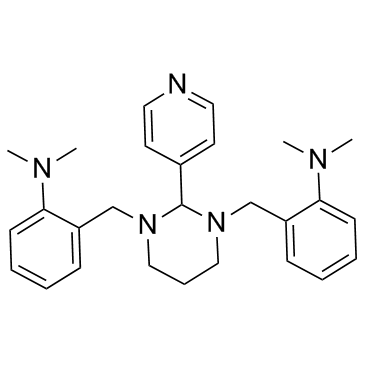500579-04-4
| Name | 2-[[3-[[2-(dimethylamino)phenyl]methyl]-2-pyridin-4-yl-1,3-diazinan-1-yl]methyl]-N,N-dimethylaniline |
|---|---|
| Synonyms |
gant61
2,2'-{[2-(4-Pyridinyl)dihydropyrimidine-1,3(2H,4H)-diyl]bis(methylene)}bis(N,N-dimethylaniline) 2-((3-(2-(dimethylamino)benzyl)-2-(4-pyridinyl)tetrahydro-1(2H)-pyrimidinyl)methyl)-N,N-dimethylaniline NSC 136476 GANT 61 |
| Description | GANT 61 is an inhibitor of Gli1 and Gli2 targeting the Hedgehog/GLI pathway. |
|---|---|
| Related Catalog | |
| Target |
Gli1/2[1] |
| In Vitro | GANT61 (20 μM) induces greater cell death than targeting Smo (cyclopamine). GANT61 (0, 5, 10, 20 μM) inhibits clonogenic survival of human colon carcinoma cell lines. GANT61 (20 μM, 0-72 hr) down-regulates Gli1 and Gli2 expression in HT29 cells. GANT61 (0, 10 μM or 20 μM) differentially regulates genes involved in the balance between cell death and cell survival[1]. GANT-61 inhibits cell viability and induces apoptosis in pancreatic CSCs. GANT-61 inhibits expression of downstream targets of Shh pathway, decreases Gli-DNA interaction, Gli transcriptional activity and Gli nuclear translocation in pancreatic CSCs. GANT-61 differentially regulates genes involved in cell survival, cell death and pluripotency. GANT-61 inhibits motility, invasion and migration of CSCs[2]. GANT61 sensitivity positively correlates to GLI1 and negatively to MYCN expression in the neuroblastoma cell lines tested. GANT61 downregulates GLI1, c-MYC, MYCN and Cyclin D1 expression and induces apoptosis of neuroblastoma cells[3]. |
| In Vivo | GANT-61 (40 mg/kg, i.p., three days per week) inhibits CSC tumor growth in NOD/SCID IL2Rγ null mice[2]. GANT61 (50 mg/kg, p.o.) enhances the effects of chemotherapeutic drugs used in the treatment of neuroblastoma in an additive or synergistic manner and reduces the growth of established neuroblastoma xenografts in nude mice[3]. |
| Cell Assay | Cells (1.5×104) are incubated with 0, 1, 5 and 10 μM of GANT-61 in 250 μL of culture medium in 96-well plate for 48 and 72 h. Cell viability is determined by the XTT assay. In brief, a freshly prepared XTT-PMS labeling mixture (50 μL) is added to the cell culture. The absorbance is measured at 450 nm with λ correction at 650 nm. The cell viability is expressed as ΔOD (OD450 − OD650). The apoptosis is determined by FACS analysis of propidium iodide (PI)-stained cells. In brief, cells are trypsinized, washed with PBS and resuspended in 200 μL PBS with 10 μL RNAase (10 mg/mL) and incubated at 37°C for 30 min. After incubation, 50 μL PI solution is added and cells are analyzed for apoptosis using a flow cytometry. |
| Animal Admin | Humanized NOD/SCID/IL2Rgammanull mice are used for the assay. Before CSC’s injection, mice are humanized with tail vein injection of human normal CD34+ peripheral blood stem/progenitor cells. CD34+peripheral blood stem/progenitor cells (500 cells/mouse, 50-75 μL volume) are injected through tail vein. After 3 days, human pancreatic CSCs (1×103 cells mixed with Matrigel, Becton Dickinson, Bedford, MA, in 75 μL total volume, 50:50 ratio) are injected subcutaneously into the flanks of NOD/SCID IL2Rγnull mice (4–6 weeks old). After two weeks of CSC implantation, mice (10 mice per group) are treated with GANT-61(0 and 40 mg/kg body weight) ip three times per week for 6 weeks. At the end of the experiment, mice are euthanized, and tumors are isolated for biochemical analysis. |
| References |
| Density | 1.1±0.1 g/cm3 |
|---|---|
| Boiling Point | 549.0±50.0 °C at 760 mmHg |
| Molecular Formula | C27H35N5 |
| Molecular Weight | 429.600 |
| Flash Point | 285.8±30.1 °C |
| Exact Mass | 429.289246 |
| PSA | 25.85000 |
| LogP | 3.53 |
| Appearance | white to off-white |
| Vapour Pressure | 0.0±1.5 mmHg at 25°C |
| Index of Refraction | 1.632 |
| Storage condition | Store at -20°C |
| Water Solubility | DMSO: >2mg/mL |
| RIDADR | NONH for all modes of transport |
|---|
